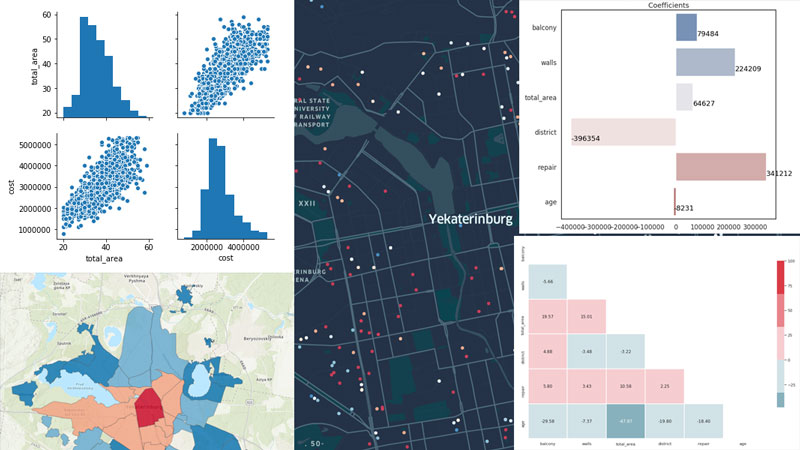Finding a good apartment is a lot of work and includes searching websites for available places and then cross-referencing with a list of characteristics. This can take hours, days or even months but in a world where cars drive themselves, it is possible to use machine learning in your hunt.
[veesot] lives in a city between Europe and Asia and was looking for a new home, and his goal was to create a model that can use historical data to not only suggest if an advertised price was right, but also recommend waiting by predicting the decrease in the the future. The data-set includes parameters such as “area”, “district”, “number of balconies” etc and tried to determine an optimal property to view.
There is a lot that [veesot] describes in his post which includes cleaning the data in terms of removing flats that are tool small or tool large. This is essentially creating a training data-set for the machine learning system that will allow the system to generate usable output. [veesot] also added parameters such districts which relate to the geographical location, age of the building and even the materials used in the construction.
There is also an interesting bit about analyzing the data variables and determining cross-correlation which ultimately leads to the obvious conclusions that the central/older districts have older apartments and newer ones are larger. It makes for a few cool graphs but the code can certainly come in handy when dealing with similar data-sets. The last part of the writing discusses applying Linear Regression and then testing its accuracy. Interpreting the model produces interesting results about the trained model and the values of the coefficients.
The python code is available and the same approach can be applied to a number of problems. We loved the commentary and we hope the author will continue working on the challenge. For those how are looking at similar problems, there is also the possibility of running regression using TensorFlow and it can be done in your browser no less.

















What could possibly go wrong…
http://edition.cnn.com/2011/TECH/web/04/25/amazon.price.algorithm/index.html
Where algorithms bid up the price of a rare book to around 23 million dollars…
Yes, It could be. I faced that problem before. For example, it can be flat in the prestigious district when price based on different things like “3 places for auto in a garage” or “nearby historical center of the city”. I hope I could overtake that problem as soon as possible. Perhaps there will be text analyse as tool of understanding why price so big.
Wasn’t that the goal of AI assistants? To empower the average person to do things formally only the big boys with deep pockets could do.
“tool small or tool large”, hahaha!
The dreaded auto correct strikes again!
Honestly to me this just sheds light on a current system that could benefit from some disruption. Its quite ridiculous that someone had to resort to using AI to comb through listings written in various layouts to acquire desired attributes from each posting. The apt/house/share systems in use now are incredibly antiquated and inefficient. Why do I have to read each craigslist ad to determine if my full sized dog is allowed in the spot?!?! I don’t understand how there hasn’t been something more efficient built and in use. I would pay a reasonable fee to use an efficient system, just as I’m sure property managers wouldnt mind paying a small fee for a service that
streamlines the property search/apply/rent process
More efficient detailed systems do exist. Real estate agents have access to those systems. So you can pay a fee (the realestate agents fee) to gain access to those systems. Or you can do it for free where it’s intentionally a clunky half functioning pile of garbage. This is someones attempt at turning the free into the paid version basically.
Realtors in Ontario don’t like to bother with anything other than high end rentals though. It’s on them to pre-approve the clients, meaning money up front for credit checks, police checks and whatever else, whereupon the clients are free to just take something off craigslist instead, and the cut the realtor gets off the landlord is kind of slim considering they might not have anywhere near 1:1 client preapproval to placements. Then often they get someone dead set and committed for a given rental, with all the paid for things checking out, the landlords often will armchair quarterback it and say nope, don’t like them. So as far as realtors are concerned, it’s almost all the hassle of listing a property for sale, with a maximum of a fifth of the return, with a potential of actually ending up out of pocket.
Requires listings to be accurate.
and/or machine readable. “Appt for rent, see pics” and from that you can figure there’s 2 beds LR, DR, bath, but doubt anything not packing a dozen GPUs and a few million lines of code is going to figure it out.
I attempted to build something similar but it turned out to be wildly inaccurate because the listing prices were very far from the sales. The bulk of the apartments being actually bought and sold were at wildly different prices than the listings staying on the market.
By scraping the realestate ads I was only getting the losers who weren’t getting sold.
I read “Apartment haunting AI”. I saw the pictures and thought about some deep learning statistics foo to find the best room to flicker the lights, creak the door hinges or play an eerie tune…
Something right in the venncenter between amazing, funny, horrifying and annoying :)
I want one! :D
As an author the original article, I would like to say that there is the second part https://habr.com/en/post/470710/. I hope it will be interesting.
Also, I want to thank everyone who left comments, ideas or question.
I know in Toronto theres a central realestate database that holds most rental data in a consistent format, but you need to scroll through hundreds of listings to figure out what you’re looking for. If there was actual intelligence that could make recommendations.. man that would be invaluable.
Lets hope this heralds a new dawn in new AI analysed insight driving successful innovation